When exploring the core of SEO basics, you might have encountered ‘meta-tag’. These crucial parts, known as meta elements, boost your website optimization. They work silently in your page’s code, telling search engines about your content.
Think of meta-tags as hidden agents in the SEO realm. They’re unseen on the site, but their effect is big. Google and other search engines use them to sort and show your site in search results. Understanding their power can change how your site ranks online.
Introduction to Meta-Tags in SEO
Meta-tags are the backbone of good SEO by helping optimize webpages and follow search engine rules. They’re key elements in the head section of HTML documents. They help search engines understand your webpage’s content.
Understanding meta-tags is vital for SEO basics. They don’t directly impact how users interact with your site. Yet, they are crucial for search engines to rank your pages well.
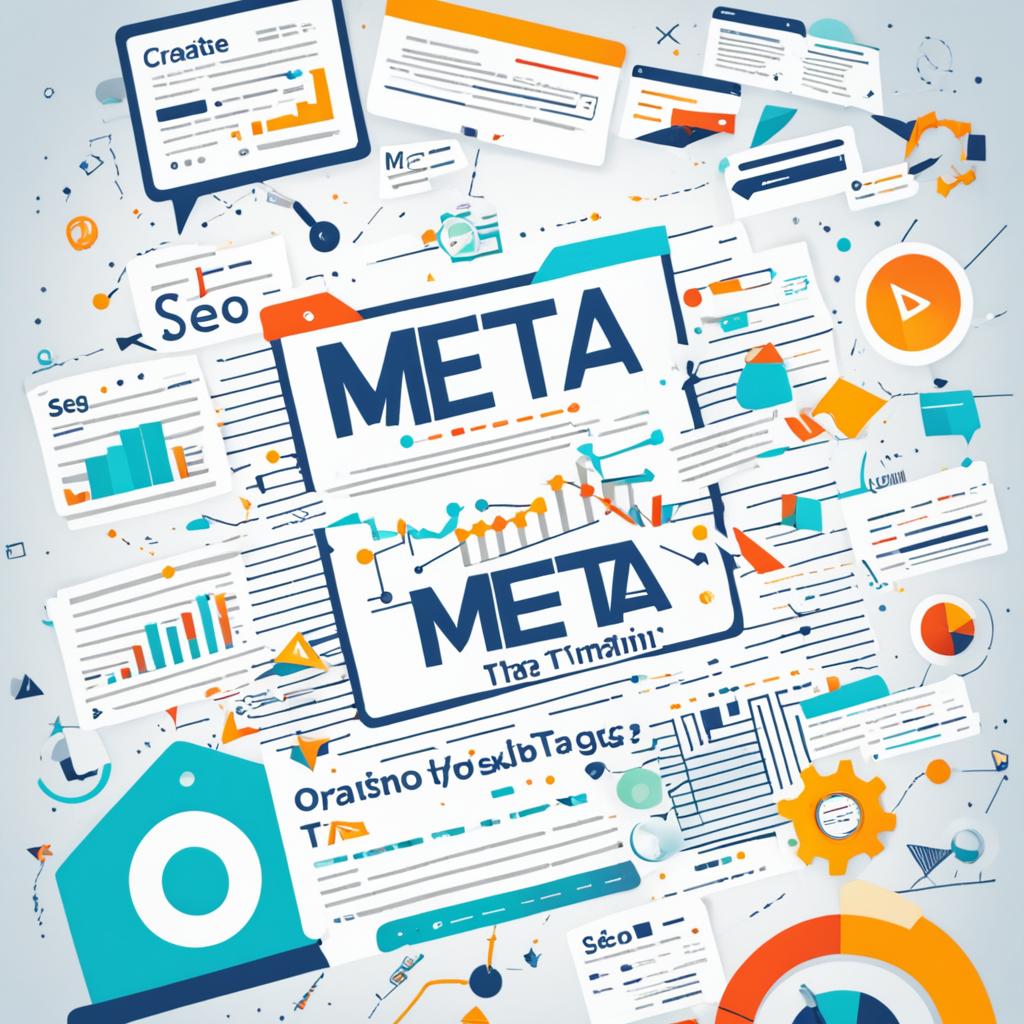
Meta-tags are essential for your webpage improvement plans. They influence not just how search engines see your site, but also how your results attract future visitors.
| Meta-Tag Element | Function | SEO Benefit |
|---|---|---|
| Title Tag | Defines the title of a webpage | Key for search ranks and getting clicks |
| Meta Description | Gives a quick summary of the webpage | Makes search results more appealing, boosts clicks |
| Robots Tag | Tells search engine crawlers what to do with the page | Helps pages get indexed correctly as per webmaster’s choice |
By using meta-tags wisely, you follow important search engine guidelines. This boosts your site’s visibility and performance in search results. These tags might be invisible to regular users, but they’re key in the competitive world of SEO.
The Importance of Meta-Tags for Search Engine Rankings
Meta-tags are key to boosting your website’s search engine visibility. They not only improve SEO ranking factors, but also increase click-through rates and enhance SERP display. Let’s explore how these essential elements can increase your organic search traffic.
How Meta-Tags Influence SEO
Meta-tags, hidden from viewers, tell search engines what your page is about. They help search algorithms accurately index your content. This makes your pages more visible in search results, increasing visits. A good title tag and meta description can greatly affect your search rankings. These are crucial SEO ranking factors.
The Role of Meta-Tags in User Click-Through Rates
Well-crafted meta-tags, like title tags and meta descriptions, boost user engagement. Enticing meta descriptions on SERPs can lure visitors to your site instead of others’. Higher click-through rates mean more organic search traffic. This shows the value of creating accurate and engaging meta-tags.
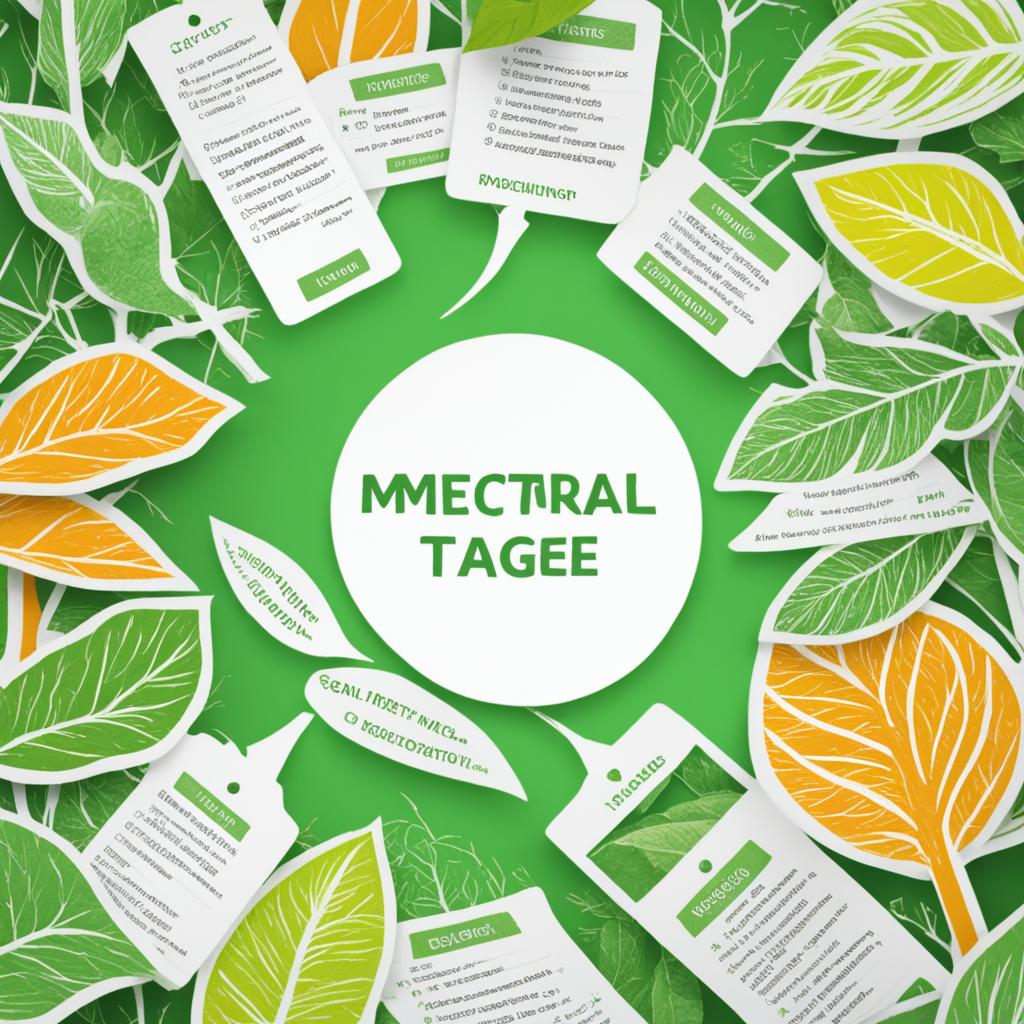
| Meta-Tag Element | Role in SEO | Impact on Click-Through Rate |
|---|---|---|
| Title Tag | Critical for direct SEO impact; signals main topic | Determines first impression in SERPs; key to user engagement |
| Meta Description | Supports title with additional context; no direct SEO impact but aids relevance | Provides compelling summary that can influence decision to click |
| Meta Keywords (if used) | Traditionally used for keyword targeting; less significance now | Minimal impact, as most search engines have deprecated its use |
While meta keywords have lost their SEO impact, focusing on title tags and meta descriptions can greatly help. They improve both your SERP position and user engagement.
Different Types of Meta-Tags and Their Purposes
Diving into SEO means learning about meta-tags and their roles. These tags not only boost your website’s visibility but also shape how people interact with your content on different platforms.
Title tags act as headlines on search engine results pages (SERPs). They’re important because search engines pay a lot of attention to them when indexing your site.
Description tags give a sneak peek of your page content. This snippet under your title in SERPs is key to drawing in clicks. Crafting engaging descriptions can significantly boost your click-through rates.
The robots meta tag tells search engines if they should index your page or not. It’s a vital tool for controlling how your pages appear to search engines.
- For social media, we use specific tags like Open Graph and Twitter Cards, known as social media meta-tags. They help display your content nicely on social platforms, which improves sharing and interaction.
Each type of meta-tag plays a unique role in optimizing your site for both users and search engines. Knowing and using these tags well can make your website more cohesive and visible online.

| Meta-Tag Type | Purpose | Impact |
|---|---|---|
| Title Tags | Define the title of the webpage | High impact on search engine ranking |
| Description Tags | Summarize the webpage content | Improves user click-through rates from SERPs |
| Robots Meta Tag | Guide crawlers on page indexing options | Controls crawlers’ access to page indexing |
| Social Media Meta-Tags | Optimize content for social sharing | Enhances content presentation on social media |
By weaving these meta-tags into your SEO plan, you direct how search engines and social platforms showcase your content. This boosts your online visibility and user engagement. Using these tags wisely can really elevate your digital footprint.
What is a Meta-Tag and How Does it Work?
A meta-tag is a short piece of text that defines a web page’s content for search engines and browsers. It’s found in the HTML document’s head section. Meta-tags are crucial in content indexing and help your website get found by search engines. Let’s examine their impact in the digital world, focusing on HTML meta-tags and how to create them effectively.
Meta-tags give search engines like Google important data when they visit your site. This info includes the page description, target keywords, and the author’s name. Good meta-tags make sure your content is easily found and well-presented in search results. This can lead to more people visiting your site.

| Meta-Tag Element | Description | Impact on SEO |
|---|---|---|
| Title Tag | Defines the title of the document, which is displayed on the SERP. | High impact on search engine ranking; essential for user click-through rates. |
| Meta Description | Offers a brief summary of the web page content. | Does not affect rankings directly but crucial for user engagement. |
| Robots Meta Tag | Directs search engine crawlers on what should be indexed or followed. | Vital for controlling crawler access and indexing behavior. |
| Content-Type Tag | Specifies the character set used on the website, aiding in text rendering. | Improves user experience by ensuring correct text display. |
Using HTML meta-tags well can improve how your site talks to search engines. By getting better at meta-tag creation, you boost content indexing. This leads to stronger SEO and a more visible online presence.
Optimizing Your Meta Title for Maximum Impact
Making your website stand out is key in the busy digital world. A good meta title boosts your visibility on search engine results pages (SERPs). Knowing how to improve your title tag can really help your site’s search engine ranking.
Finding the Right Title Length and Keyword Density
Keep your meta title under 60 characters to avoid being cut off on SERPs. Adding important phrases within this limit helps with keyword optimization. It increases your page’s search relevance. It’s not just about the length, but choosing powerful words for algorithms and visitors alike.
Crafting a Compelling Meta Title That Stands Out
Your meta title must catch the eye and encourage clicks. Use action words and clear descriptions to make a difference. Highlight what makes your page unique to compete better on SERPs.
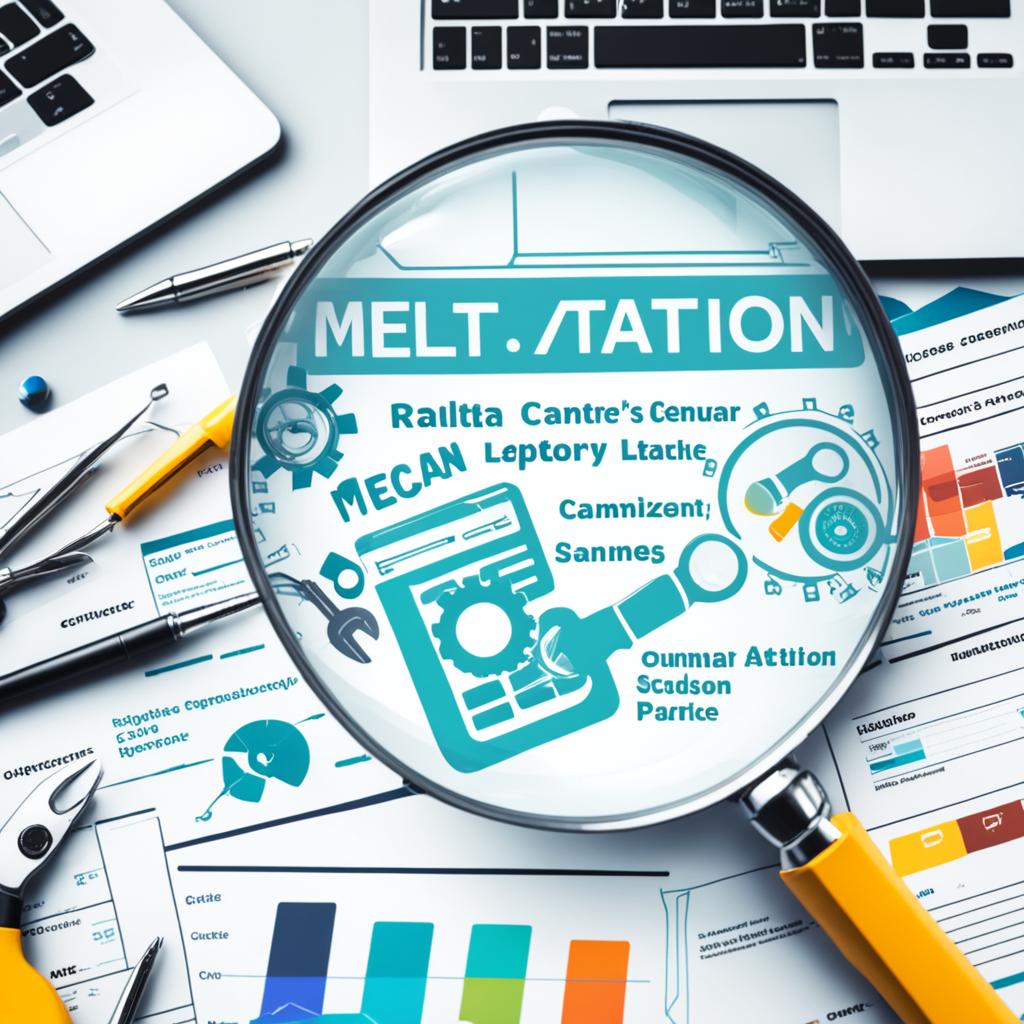
- Start with an action word: “Discover,” “Explore,” “Find”
- Include primary keywords efficiently: “Best Organic Coffee Beans”
- Give a hint at what the user gains: “for Unmatched Morning Brews”
These tips might lead to a meta title like: “Discover the Best Organic Coffee Beans for Unmatched Morning Brews.”
Improving your title can really increase your click-through rates. This drives more traffic to your website. It might even raise your page’s search ranking. Using title tag optimization shows how relevant your content is to searches. This is key for getting and keeping a high spot on SERPs.
Meta Descriptions and Their Effect on Web Traffic
Understanding meta description optimization is key for boosting your site’s visibility. Although meta descriptions don’t directly influence rankings, they have a big impact on user decisions in search results.
A well-made meta description serves as a short ad for your content. It lets you engage users and encourage them to visit your site. This can increase click-through rates a lot. It offers a sneak peek, helping users see if the content is what they’re after.
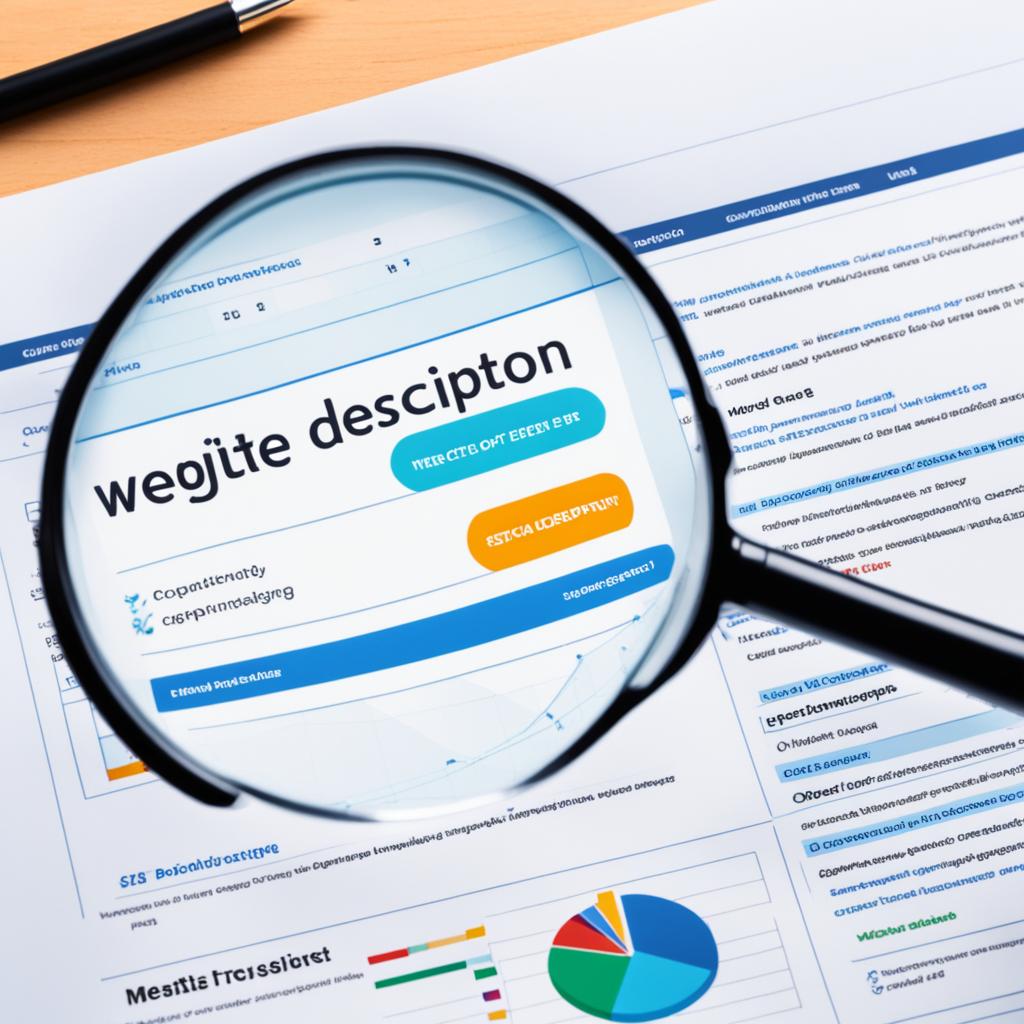
For better SERP engagement, your meta description must grab attention and inform. It should clearly summarize the page content. Including targeted keywords smoothly is also crucial for staying relevant. Here’s how good meta descriptions boost your traffic:
- They spotlight your page’s key points or benefits, making your listing more attractive.
- They use language that inspires readers to act, raising the chances of clicks.
- They contain relevant keywords to keep your page appearing in the right searches.
Now, here’s a side-by-side look at optimized and non-optimized meta descriptions. We’ll see their effects on click-through rates:
| Page | Meta Description Quality | Average CTR | User Engagement Level |
|---|---|---|---|
| Home | Highly Optimized | 12% | High |
| About Us | Non-Optimized | 4% | Low |
| Services | Moderately Optimized | 8% | Medium |
| Contact | Highly Optimized | 11% | High |
In summary, investing time in crafting engaging meta descriptions can greatly up your online visibility and engagement. Although they don’t directly change SEO rankings, their role in boosting SERP clicks can better overall page performance and increase traffic.
The Significance of Keywords in Meta-Tags
Optimizing your website starts with a close look at keywords in meta-tags. Knowing how to pick and use keywords can make your site more relevant to searches. It also takes your on-page SEO higher.
Identifying Your Target Keywords
First, you need to research keywords. Find out what your potential customers are looking for. Also, see how these searches match your content. By knowing the most common questions and language, you make your meta-tags more relevant to users.
Strategies for Integrating Keywords into Your Meta-Tags
After finding your keywords, you must put them in your meta-tags smartly. Aim to naturally include keywords in title tags and meta descriptions. This step boosts the relevance of your content’s meta-tags and supports your SEO work. Avoid too many keywords to prevent SEO penalties, which can harm your site.
It’s smart to use long-tail keywords too. They match specific searches and draw in people ready to buy. Using these keywords well improves your SEO strategy and brings in a targeted audience.

To enhance your SEO with meta-tag keywords, it’s not just about the keywords you choose. It’s about how well you place them in your site’s metadata. A smart approach boosts your online visibility and connects your content with the right people.
Best Practices for Crafting Effective Meta-Tags
To do well online, it’s key to know how to make good meta-tags. Making your site’s SEO better starts with good meta-tag building. This aim helps make your site more visible on search engines and keeps users interested.
Keeping Meta-Tags Concise and Relevant
Meta-tags need to be short and to the point. A clear, focused tag makes it easier for search engines to find and rank your content. It also helps people quickly see what your page is about. This can lead to more visits to your site, which is crucial in a competitive online space.
Avoiding Duplicate Meta-Tags Across Your Site
Using the same meta-tags on different pages is a big no-no; it can harm your site’s search rankings. Every page should have unique meta-tags that show what it’s about. Repeating tags can mess up your SEO work and confuse search engines about your pages’ content.
Using Tools to Analyze and Improve Your Meta-Tags
Today, using SEO tools is a must for digital marketing. These tools can check and better your meta-tags. They evaluate things like tag length and how relevant your tags are. This helps make your tags fit SEO better and push up your search rankings.

By focusing on meta-tag quality and using SEO tools, you can greatly improve your site’s search presence and user engagement. Meta-tags might work behind the scenes, but they have a big impact on your online success.
Conclusion
Starting an SEO strategy can feel overwhelming. But, getting good at meta-tags can really make your website stand out. Meta-tags do more than just fill space; they’re key in helping your site get noticed. They help search engines understand your content, bringing more visitors.
Now, you know just how vital meta-tags are. They influence how well your site does in searches and play a big role in getting clicks. Make sure your meta-tags, like titles and descriptions, are clear and match your content. This way, search engines will better match your site with what people are looking for.
Improving your site’s SEO, including meta-tags, is an ongoing task. Check your meta-tags often to find ways to make them better. Stay up-to-date with the latest SEO trends and changes. By consistently working on your SEO strategy, you’ll see great results. Your site will become more visible and successful in the crowded online space.

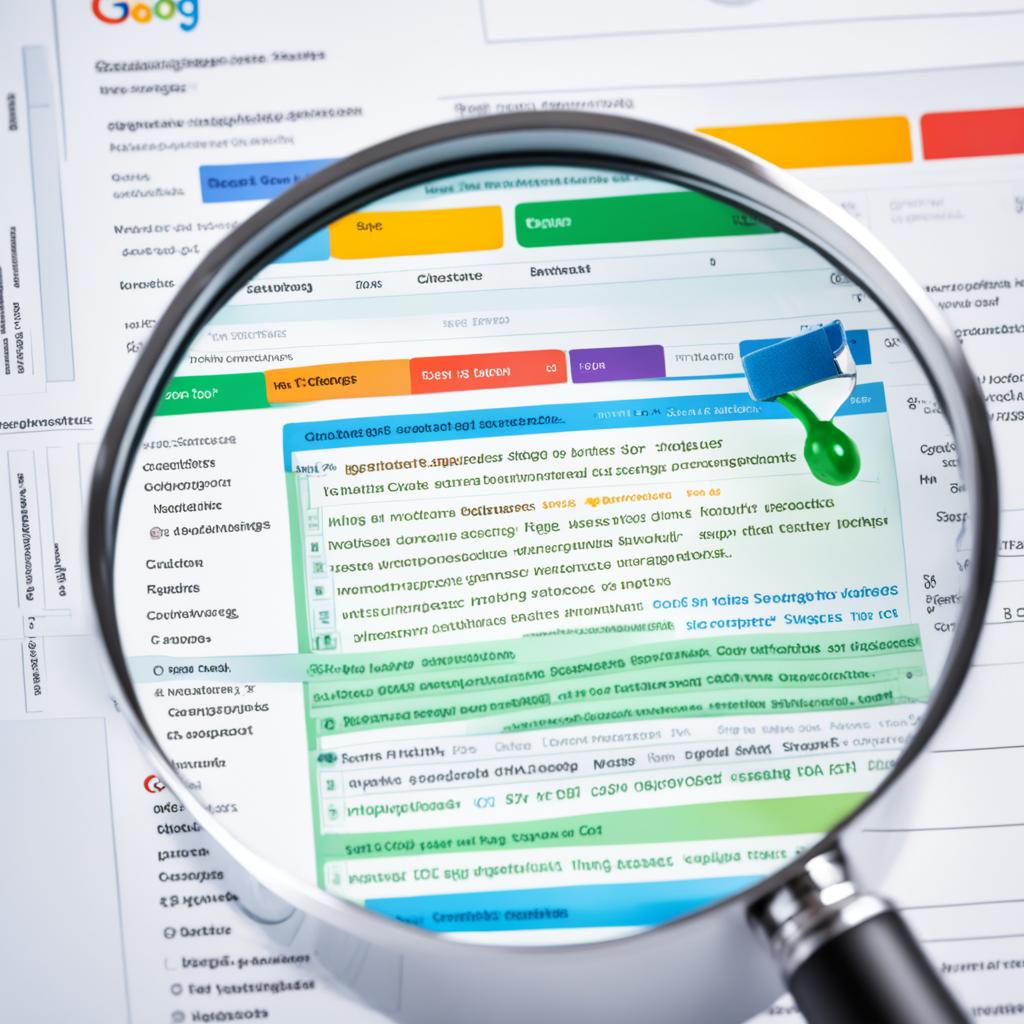
Leave a Reply
You must be logged in to post a comment.